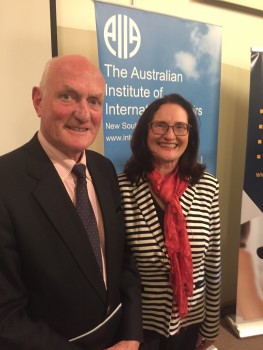South Africa
Our guest speakers at Glover Cottages on 16 August were Judy Sandison, an award-winning South African broadcast journalist, and Adam McCarthy, Australian High Commissioner to South Africa. Taking as their theme ‘South Africa and its Media – Turbulent Times’, they traced the Republic’s progress in the 22 years since millions of South Africans were enfranchised and able to vote for their government of preference under Nelson Mandela in 1994. Judy said that before then the country was a police state. Journalists were followed by the police, beaten and jailed if transgressing a host of repressive laws, including laws against assembly. Nowadays freedom exists and the press is flourishing – to the point of being said to be South Africa’s Opposition. The media are protected by a fine constitution, an independent judiciary and a press ombudsman, although as in other democracies, newspapers are having to meet the challenge of social media. Judy said that the abolition of apartheid had been like a big foot being taken off South African necks, although not enough citizens have yet embraced the responsibility that goes with the enjoyment of human rights. Today, vestiges of apartheid still shape South African politics and society, and many challenges remain, including unequal incomes and the prevalence of violent crimes, especially against women and children. Judy said that with 50 million people living in nine provinces and speaking thirteen languages, South Africa is indeed the Rainbow Nation, full of potential, never boring.
Adam McCarthy said the country was at a crucial juncture in its development. It could go one of two ways – towards greater stability that would come with the reinforcement of democracy and freedom, or towards weaker government, instability and corruption. While some members of the ruling ANC Party are involved in patronage and profits, others are committed to constitutional politics. He observed that one among many surviving legacies of apartheid was a two-track education system. The working classes comprise 85 percent of the population and receive substandard education. Adjustments must be made. On the plus side of the ledger, the Constitution Court is free from corruption, and there are many fiercely independent NGOs. It took the English 700 years to sort out the levers of power. Things are moving much more quickly in South Africa, but immense problems remain before stability can be guaranteed.
Richard Broinowski
